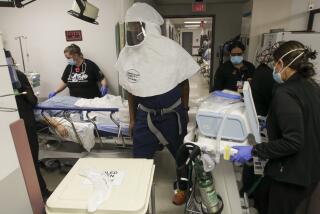DOCTOR DOOM
- Share via
I am Nurse Jane Doe, the nurse who became HIV-infected at San Francisco General Hospital after a “single needle stick” in July, 1987. In “Doctor Doom,” by Michael Rogers (April 21), Lorraine Day once again uses my situation to further a personal agenda of AIDS hysteria and the violation of patients’ rights.
Day has consistently promoted mandatory testing of patients. Since a policy of mandatory testing may jeopardize the personal liberties of the patient, one must weigh carefully what benefit knowledge of the patient’s HIV status will afford the health-care worker. Health-care workers are currently expected to employ universal precautions in keeping with the presumption that each patient is HIV positive. Such practice is necessary since the presence of HIV antibodies routinely takes six weeks to six months to manifest in the blood test. A negative result can seduce the health-care worker into a false sense of security. If knowledge of a positive result will not ultimately alter the health-care worker’s practice, why call for mandatory testing? Will awareness of a positive result lead to the withholding of surgery, treatment and care?
From the patient’s perspective, the documentation of a positive result opens the patient up to possibilities of discrimination by insurers, employers, landlords. A positive result may be psychologically traumatic.
While working as a nurse, I did not need to know the HIV status of my patients. At the time of my needle-stick injury, I was following hospital policy, treating all designated body substances as if they contained HIV. What I did need was access to a safety device that would provide a barrier between my hand and a bloody needle. Such devices existed but were not used in my institution due to cost. Availability of these safety devices at a reasonable cost is long overdue; annually more than 6,000 health-care workers contract hepatitis B on the job. (It is difficult to comprehend Day’s casual attitude toward being “drenched in blood” prior to 1983 when 300 health-care workers die each year of occupationally transmitted hepatitis B. Could the greater focus on the weaker, less virulent HIV virus by people like Day be a response particular to the stigma of HIV?)
Four years ago, Day would have claimed that her mandatory testing policies were put forth to protect my rights as a health-care worker. Now that I have actually crossed the line to being a “patient,” my personal liberties lose their priority in her eyes and my access to treatment may be jeopardized.
JANE DOE, RN
San Francisco






